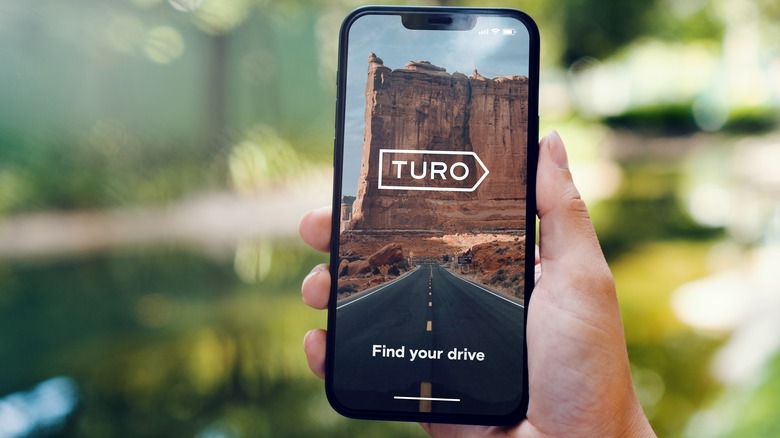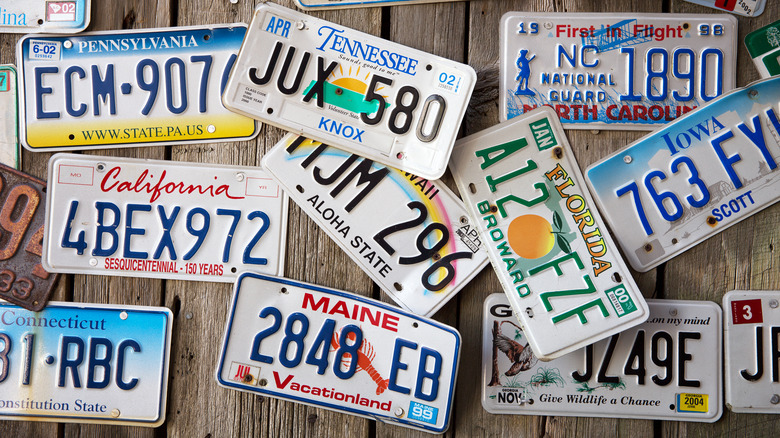Everything You Wanted To Know About Turo, The Car Sharing Marketplace
Turo is a car-sharing marketplace operating in the United States, Canada, the U.K., Australia, and France — we'll explain all you need to know about this unique car-sharing platform. Turo bills itself as a cheaper and more flexible alternative to traditional car rental services, and Turo's operation is similar to short- and long-term accommodation platforms. Guests can choose from and book a variety of vehicles on Turo's car-sharing marketplace, from rugged SUVs to luxurious sports cars and grand touring sedans.
Turo guests use filters such as vehicle type, rate, and host status when choosing their rides. Guests may be able to score deals on the vehicles they choose, but this depends on whether the host offers any deals. On the other hand, hosts — or those sharing their vehicles — use Turo to rent out their vehicle (or vehicles) for as short or as long a time as they wish, while setting their rate and managing their car-sharing operation via Turo's app.
Both Turo guests and hosts are obligated to fulfill certain requirements when renting or sharing a vehicle. These responsibilities are vital to both properly using Turo and getting the most out of this sharing network, as a guest or a host. Information for this guide was sourced directly from Turo itself and Travelers, the insurer providing third-party liability coverage to Turo guests and hosts in the U.S.
What you need to book on Turo
To book a vehicle on Turo, the first thing to do is create an account, either through Turo's website or via Turo's mobile app, which is free to download. To book a vehicle in the U.S., guests need to be at least 18 years of age and carry a valid driver's license. You'll be asked to upload your driver's license and some other information into the Turo app before going through a brief approval process. Approval is usually granted immediately, or shortly thereafter. Upon approval, you'll be able to book a vehicle on Turo.
Turo is an international vehicle sharing marketplace, allowing you to book vehicles in other countries. But keep in mind requirements to book a vehicle on Turo differ slightly depending on location. For instance, guests in the U.S. need to be 18 years old to rent a vehicle, but that doesn't mean an 18 year old guest can book any vehicle they'd like — U.S. guests must be 30 years old or older to rent a vehicle in the Super Deluxe category. For all eligibility requirements for booking in any of Turo's five markets around the globe, Turo lays this information out in a handy driver eligibility page.
Other (authorized) drivers can operate the vehicle
If you want another person to be able to drive a Turo vehicle booked under your name, you (as the primary driver who booked the vehicle) must request to add a driver through the Turo app. This is an easy procedure, similar to adding a driver to a car rental contract. Any person wishing to drive a Turo vehicle booked by someone else must first create a Turo account, meet any eligibility requirements in that country, and be verified by Turo before being approved to drive. Guests can add up to eight additional drivers to a vehicle.
Only Turo guests in the U.S. and Canada can add drivers to a trip once that trip has started. In the U.K., Australia, and France, any additional drivers will need to be added to a trip before it starts to be eligible to drive. Once a Turo trip starts outside North America, no additional drivers can be added to the vehicle. One thing to remember — Turo does not offer any wiggle room about allowing unauthorized drivers to drive a Turo vehicle. If Turo finds out you allowed an unapproved driver to drive a Turo vehicle, your Turo protection plan will become void.
Turo's cancellation policy
Turo offers flexibility when canceling your trip — so long as you cancel more than 24 hours in advance, you will receive a full refund. If you book a Turo vehicle less than 25 hours before starting your trip, a full refund is only guaranteed if you cancel one hour after your initial booking. All cancellations are based on the vehicle's time zone. So, if you live in New York City and need to cancel a Los Angeles booking, you'll need to cancel more than 24 hours ahead according to Pacific Standard Time. Use the messaging function within the Turo app and follow the steps to cancel a booking when notifying your host. Shortening your trip may bring extra fees if you don't follow Turo's rules, similar to returning a rental car early (or late).
Hosts are charged a $50 fee for canceling a trip within 24 hours of a trip start time, and $25 if you cancel a guest's trip more than 24 hours in advance. Hosts should notify guests via the Turo app as soon as possible when canceling. If a guest re-books with the same host within 24 hours, the fee will be waived. Every time a host cancels, Turo generates an automated review which is attached to the vehicle listing, noting when and why the cancelation occurred. If a host cancels multiple trips, Turo may penalize the host. This could mean a host losing All-Star status or even being removed from Turo.
Can I get my Turo vehicle delivered to me?
Your Turo host will deliver your vehicle to you, but there is a catch — it all depends on your host, the type of vehicle you have booked, the length of your trip, and other factors. Only some Turo hosts offer free delivery, while others add a fee to deliver the vehicle. Before accepting delivery of your Turo vehicle, make sure you check in with the Turo app first. Once your ride has arrived and you have the keys, you're good to go.
According to Turo, guests should be strategic when looking for hosts offering free delivery. Booking vehicles that are close to travel hub locations, such as airports, hotels, and train stations, increase your chances of finding vehicles with free delivery. As well, the longer your trip, the more likely your host will offer free delivery. That said, read the fine print of your booking to see if the host will deliver the vehicle for free. If you aren't sure, ask your host.
How much does it cost?
Your Turo trip price depends on several factors, including the type of vehicle you book, your trip length, trip location, and more. The host sets the daily rate. This rate may fluctuate throughout your trip — if part of your trip falls on a weekend, your host may charge more for those days. Any extras included in your bookings, like pre-paid fuel or host-provided equipment (such as camping gear), will incur extra charges as set by the host.
Turo charges a trip fee as part of the overall trip price. This fee goes back to Turo to help keep the platform running. The trip fee varies for every trip. In the U.S., Turo will take anywhere from 2.5% to 100% of the trip price as its fee, though this depends on trip circumstances. Factors affecting the Turo trip fee include the vehicle's worth (a luxury car will have a higher trip fee than a lower-tier vehicle), the length of the trip, the time the trip was booked (closer to the trip date likely means a higher trip fee), and other factors.
Also, some trip bookings in the U.S., U.K., and Australia come with a young driver fee, ranging from $30 to $50 depending on the booking driver's age. This shouldn't be a surprise, as rental companies often charge car rental fees for young people. Turo does not charge a young driver fee in Canada or France.
Guest liability insurance with Turo
When you sign up for Turo and book a vehicle in the U.S., you are automatically covered by Turo's third-party liability insurance, underwritten by Travelers. Liability coverage shields guests from financial consequences up to the policy's limit if the guest is deemed at fault for an accident in a Turo vehicle. This insurance covers medical bills in cases of bodily harm to another person, and/or physical damage to someone else's vehicle or property.
Guests in all five of Turo's markets — the U.S., Canada, the U.K., Australia, and France — are not required to carry their own personal liability insurance when booking on Turo. If you have personal auto liability coverage, Turo's liability coverage acts as supplemental coverage to your policy. This means Turo's coverage kicks in once your own liability coverage has been exhausted.
Turo guests are covered by different amounts of liability coverage in each of Turo's five markets. In the U.S., guests are covered by up to $750,000 of liability coverage. In Canada, guests are backed by $2 million CAD ($1.47 million) in liability coverage. Turo supplies $20 million AUS ($1.31 million) of liability coverage to guests in Australia. U.K. guests are supplied with an unlimited amount of bodily liability coverage and £20 million ($25 million) in property liability coverage. In France, guests are covered by an unlimited amount of bodily liability coverage and €100 million ($107 million) in property damage liability coverage. Turo supplies a handy breakdown of the liability coverage offered across its five markets.
Guest physical protection plans from Turo
Turo offers optional physical protection plans covering all or some damages to your shared Turo vehicle if you are involved in an at-fault collision. Keep in mind physical protection plans are not insurance — they are agreements between Turo and the guest regarding how financial responsibility would be split up if a guest is responsible for exterior damage to a Turo vehicle. These plans do not cover mechanical or interior damage.
Guests can decline to buy a physical protection plan, but Turo strongly urges guests to purchase some level of protection. If your Turo vehicle is damaged due to your actions, and you don't have a protection plan, you'll be responsible for covering those costs. Turo recommends protection plans because many credit cards and car insurance policies do not cover peer-to-peer vehicle sharing. A credit card or personal insurance policy may suffice in lieu of rental car insurance, but car-sharing is different.
In the U.S., there are three types of physical protection plans — Premium, Standard, and Minimum. The Premium plan costs 65% of your trip price but limits your financial responsibility to $0 for exterior damage to your Turo. The Standard plan costs 40% of your trip price and limits financial responsibility to $500 — any costs above that are covered by Turo. The Minimum plan ranges from 18% to 25% of your trip price, depending on trip length. This plan limits a guest's responsibility to $3,000. Physical protection plans are slightly different across Turo's five markets.
Roadside assistance for Turo guests
Turo provides 24/7 roadside assistance in the U.S. and Canada only to guests who purchase a physical protection plan — this assistance includes lockout services, fuel delivery, jumpstarts, tire changes, and more. The more robust plans offer access to more services. Flat tire changes are covered by the Premium physical protection plan, but not by the Standard or Minimum plans. If your Turo vehicle gets a flat tire due to an accident or vandalism and you only carry a Standard or Minimum plan, you'll be on the hook to cover that cost. Turo offers similar roadside assistance plans in the U.K., Australia, and France.
If on-the-spot roadside assistance doesn't solve the problem, or if your vehicle leaves the road and needs recovery, the vehicle will be towed to an authorized garage, and the roadside plan will cover this cost. If Turo determines that a guest has violated Turo's Terms Of Service resulting in vehicle damage, roadside assistance will not be made available.
Turo's pitch for vehicle owners to become hosts
Turo pitches its peer-to-peer vehicle-sharing marketplace as a place where hosts can generate passive income and build entrepreneurial skills. According to Turo, sharing a vehicle is a great way to make thousands more dollars in income. Since there are no limits on how many vehicles a host can share on Turo, the possibility exists of leveraging your vehicles to earn more income and speed up the return on investment in your vehicle.
No entrepreneurial experience is necessary to start a car-sharing business on Turo, and hosts can manage their entire inventory of vehicles on the Turo app. The app also gives hosts the ability to message guests, adjust inventory and pricing, and accept trips. Turo provides 24/7 support to hosts, and insurance is provided for all hosts. According to Turo, the platform boasts more than 14 million guests worldwide, so money-making opportunities are available — it's up to hosts to cash in on those opportunities.
How much money can Turo hosts make?
The amount of money a Turo host can make depends on a slew of factors, including the number of vehicles a host shares, the rates charged for guests to use those vehicles, a vehicle's age, the region a host is located in, demand, and more. Before signing up as a host, use the Turo Carculator to get an estimate of how much money you could make sharing your vehicle. The Carculator allows you to search by budget or by vehicle to get an approximation of how much money you might earn, measured against the national average or the average of hosting a vehicle in your country's biggest cities.
To start, Turo places every host vehicle in a price range based on the vehicle's value. In the U.S., Canada, and the U.K., all of a new host's vehicles are opted into Turo's Automatic Pricing, if available. This means Turo's Automatic Pricing adjusts your vehicle's price based on vehicle age, location, trip history, and demand for the vehicle. You can opt out of Automatic Pricing by switching this feature off in the "pricing and discounts" tab. When setting prices manually, your rate must fall within Turo's minimum and maximum price range set for your vehicle.
Insurance for Turo hosts
All Turo hosts must carry their own personal auto liability insurance, even though Turo automatically protects hosts with up to $750,000 (in the U.S.) of third-party liability coverage. If a host's shared vehicle is involved in a collision and they are deemed liable for bodily injury and/or physical property damage, the host's personal insurance would kick in first. Only when and if that personal liability insurance is exhausted would Turo's supplemental liability coverage kick in.
Turo's third-party liability coverage for hosts covers different amounts of liability in each of Turo's five marketplaces. In Canada, Turo automatically provides up to $2 million CAD ($1.47 million) in liability coverage. Turo provides up to $20 million AUS ($1.31 million) in liability coverage for Australian hosts. In France, bodily injury liability coverage for Turo hosts is unlimited, along with €100 million ($107 million) in property liability. In the U.K., Turo provides an unlimited amount of bodily injury liability and £20 million ($25 million) in coverage for property liability claims.
Protection plans for Turo hosts
Unlike Turo guests, Turo hosts are required to purchase a physical protection plan for their vehicles. As with guests, a host's physical protection plan is not insurance. Rather, a host physical protection plan is an agreement between Turo and the host about how to split up the cost of repairing exterior vehicle damage if a guest is involved in an at-fault accident.
In the U.S., Turo offers five protection plans, the 60, 75, 80, 85, and 90 plans — the numbers indicate the percentage of the overall trip fee a host earns with each plan. The 60 plan is the most comprehensive and includes 100% coverage of eligible damage costs, no deductible, and eligible wear and tear reimbursements. In comparison, the 90 plan, where hosts keep 90% of the overall trip fee, is far less comprehensive — it includes a $2,500 deductible, no coverage for damage costs, and no wear and tear reimbursements. Physical protection plans vary from country to country, and the company offers protection plan breakdowns for Canada, the U.K., Australia, and France.
Reimbursement for a replacement Turo vehicle
In the U.S., Turo offers reimbursement to hosts if their vehicles are rendered undriveable for a period of time, but this depends on the protection plan a host has. Only the 60 and 75 plans offer reimbursement for a replacement vehicle if a guest damages a host's vehicle and it needs repairs. The 60 plan offers the option of replacing lost hosting income during the time the vehicle is off the road, or $50 per day for a replacement vehicle (for 10 days only). The 75 plan only offers a $30 per day replacement fee for a rental vehicle if a host's Turo vehicle is being repaired, for 10 days only.
The other physical protection plans do not offer any reimbursement for replacement vehicles for U.S. hosts. As with all of Turo's protection plans, the details vary from country to country, so if hosting a vehicle outside the U.S., get the lowdown on reimbursement for replacement vehicles in Canada, the U.K., Australia, and France.













